#(which is a different nuanced discussion for another time)
Explore tagged Tumblr posts
Note
my friends and i are making characters to play in a Eureka! campaign. the rulebook advises players to not corroborate to make characters—at least not on a mechanical level—as party balance isn't an issue
however, one of my friends brought up a concern: in a system without classes (which btw, i love the trait and skill system and how it essentially allows completely freestyle classes in a fully character driven manner), what makes one character stand out from another?
they brought up that in Eureka!, a monstrous PC could have all the skills of another player's mundane PC, as well as additional monster abilities and weaknesses. especially in a party with more than one monstrous/mage PC, the mundane PCs could have little that sets them apart mechanically if players don't discuss what stats or traits they're taking.
in a balanced class system, each PC stands out as they have a skillset different than the other PCs which forces them into the spotlight when their class features are necessary. obviously, mechanics are far from the only thing that makes a PC unique or otherwise stand out, and i think an interesting character arc or personality makes them just as interesting and unique
but if mechanics are half or even a quarter of what makes a PC stand out/unique from the rest if the party, how do you suggest making sure none of the players feel that they get lost in the shuffle of the party/plot?
There’s quite a few complex answers to this question but I’m gonna give it my best. I think your friends might be thinking of the “composition” of the Eureka party a bit too much like, say, an Overwatch team comp. gotta have tank, DPS, healing, etc., and they worry that if they don’t collaborate then they’ll end up with too many DPSs and not enough healers or whatever. That shouldn’t be a concern at all.
Firstly, at the time of writing this, Eureka has about 60 Traits, and PCs have 3-6 each. I find the likelihood of two characters in the same party having all the same Traits to be pretty low. Plus there’s 21 Skills set between -3 and +3, and a Tiers of Fear chart, and all that is before you even get to the Truth element, which is so freeform that I have a really hard time believing that two PCs in the party will have the same one. All of these mechanical elements of the PC make up their personality and background, and those are the things that make a character. So I think it’s overall really unlikely that two PCs are going to end up too similar.
Another thing is that Eureka isn’t really about archetypes, it’s about people. What makes two people in real life stand out from one another? “Everything” and “nothing” are both correct answers. The difference between two Eureka characters probably won’t be something you can tell just from the silhouette of all their signature tactical gear and weapons and clothing, they’re just guys. It’s much subtler, and Eureka gameplay is designed to bring up those subtle nuances of which makes two normal people unique from each other. And the fact that supernatural characters can also be normal people is very important. If a vampire ends up being “just like you or me,” well, that’s good!
As for “spotlight” and making sure players don’t feel like their PCs are lost in the shuffle, refer back to the Overwatch team comp. comparison. One of the reasons we made it a rule that you don’t collaborate on party composition is because we don’t want you to have a “balanced” party. We don’t want Eureka to be played with a video-game-y “party balance” mindset. People in real life aren’t balanced. Eureka parties aren’t expert teams of specialists assembled to complete a mission, they’re random guys who end up getting themselves into trouble. Grab 5 random people off the street, or grab 5 people you know personally, and you’ll find that they probably don’t make a very balanced party if you were to translate their real life skills and traits into a Eureka character sheet.
And this is good!
Let’s say you end up with a party where nobody has any good Interpersonal Skills(very common occurrence when we play Eureka), and that party comes to a situation that would be very easily handled with a very obvious solution if they had good Interpersonal Skills. Well, the “easy” course of action is blocked off to them. Now, they have to really get creative, or maybe just lose and die.
If this were a video game, this would just be a softlock or a game over, if your character doesn’t have The Skill, they can literally not complete this objective, but it’s a TTRPG, and that’s the strength of TTRPGs over video games.
In a TTRPG, the full range of human possibilities are available to the PCs, and a defeat/loss/death can be more interesting than just “Game Over.”

#rpg#ttrpg#tabletop#indie ttrpg#ttrpg tumblr#indie ttrpgs#ttrpgs#ttrpg character#ttrpg design#ttrpg community#eureka#eureka: investigative urban fantasy#monster#monsters#urban fantasy#investigation#supernatural#supernatural rpg#noir#neo noir
61 notes
·
View notes
Text
i sometimes worry about how much this website romanticizes drug use
#tw drug mention#do not get me wrong!!! i am not a narc or against drugs or anything like that#and by NO means should we demonize addicts. they are people and they deserve respect#that being said: i’m worried#i have a family history of addiction on both sides of my family#all of my grandparents have smoked at one point. some of them smoked until they died (not from smoking but it sure fucked them up)#both of my parents were smokers#my mom stopped smoking when she got pregnant and never really started again#she’s told me now the thing she has to be careful with is food#(which is a different nuanced discussion for another time)#my dad has always had his vices#he’s fully hooked on nicotine. he’s been trying to stop smoking but he still goes through a sleeve of nicotine candies in a month#(it’s a lot. he buys like 6 containers at a time)#he’s been smoking cbd (legal here but even if it weren’t i am Not A Narc)#and of course he’s been trying to wean off of his prescribed painkillers#(he is taking them as responsibly as he is able to do not demonize my father)#which is. hard#all this to say i am incredibly prone to addiction#it’s in my blood and i grew up watching it#and it is not something to be taken lightly. at all#am i against drugs? no. am i against self-medication? no#but oftentimes this site talks about drugs as if they don’t have the potential to be incredibly dangerous#which they can be.#and if we ignore that then i worry people are going to get themselves addicted#and that’s expensive. and deadly#and if you can prevent being addicted i think that you should by any means#i don’t plan on drinking much. i don’t plan on smoking anything at all#i may do edibles from time to time#but this sort of stuff needs to be in moderation#idk. i just see a lot of glorification of drugs here and it worries me
1 note
·
View note
Note
do you have any older examples of people playing around with pronouns (gender neutral or otherwise) in a queer way? most stuff I'm finding on my own is all mid to late 20th century :')
I think I have the perfect story for you! That of Zinaida Gippius, here is a quote from their article:
"A Russian poet, their discussion of their own identity is held within the culture and understandings of the Russian language. This is particularly relevant in the Russian language's use of grammatical gender, which is something that the English language is unable to capture in any meaningful way. Within their poetry, Gippius made a point to switch back and forth between masculine and feminine gendering, leaning towards the masculine. In the study of their poetry, this has been demonstrated for English readers through coloured text, with one colour used to indicate when they are using feminine gendering and another for masculine."
It was an interesting article to write, as there was a legitimate reason to use he/him/his pronouns, she/her/hers, and they/them/theirs, so we used all three.

Here are some interesting quotes about gender from them:
"The bodily differences between an actual man and an actual woman are important, of course. The body here should be viewed as a sign of the predominance in a given human being of the [Female] or [Male] principle […] the body itself is not integrally reflective of the [Male] or [Female] principle and, second, the body does not determine personality."
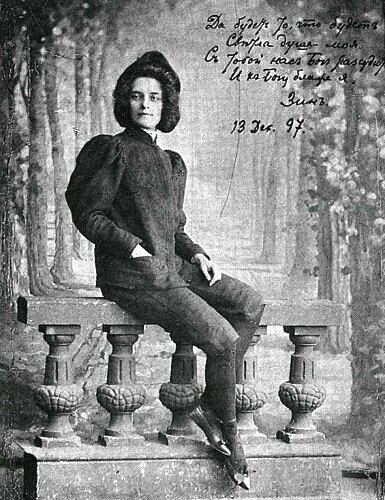
"I do not desire exclusive femininity, just as I do not desire exclusive masculinity. Each time someone is insulted and dissatisfied within me; with women, my femininity is active, with men-my masculinity! In my thoughts, my desires, in my spirit-I am more a man; in my body-I am more a woman. Yet they are so fused together that I know not."
"Thus, in all the tangled threads of reality—in all its minutiae, errors, and nuances—one may uncover the selfsame effectual Principles [pure masculine and feminine]: separated and conjoinable, conjoined and separable."
#queer history#queer#lgbt#lgbt history#transgender history#transgender#making queer history#answered
1K notes
·
View notes
Text
Katara and Mutuality in Relationships
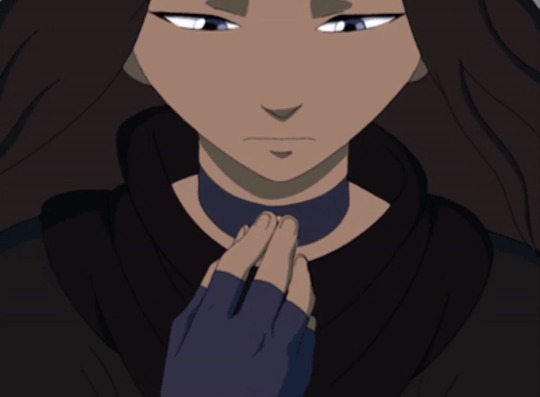
There are lots of conflicting opinions about which characters Katara felt attraction towards, which characters she didn’t, and how long she felt that attraction. I see in most cases, people point to quick clips of her faintly blushing or kissing another character on the cheek as evidence, but I think these kind of takes miss the nuance of the purpose attraction serves in a story.
Most importantly, I see these characters treated as if they are actually people capable of making their own decisions. It’s important to remember that these are fictional characters. They don’t make their own choices; the writers make their choices for them for the purpose of telling a story. From that standpoint, it’s more valuable to examine how a character’s story and narrative themes tie into their relationships with other characters. Animators can shove in a kiss or a blush wherever they want, but it’s harder to demonstrate through storytelling how and why two characters might feel attraction towards one another, and how a relationship between them would develop both characters and contribute to the overarching themes of the story.
In other words, when discussing which characters Katara is “attracted” to, I’m discussing which relationships and actions within the narrative build on her established story and arc. Romance is always integrated into a story for a reason, and considering that reason is important.
Unfortunately, ATLA is very much a product of its time in this way. It’s easy to see what romance adds to the arcs of the male characters—but not so much with the female characters. All three canon relationships (kataang, sukka, and maiko) follow this trend to some degree. The primary purpose of the woman in this narrative is to act as a prize for the man for performing some good deed. Once they’re together, she ceases having her own motivations and becomes an extension of the male character she’s dating. This is pretty blatant with Suki—she barely had a personality in that later seasons; she is there to be Sokka’s girlfriend. Similarly, Katara becomes a completely different character—she’s even animated differently—when the narrative pushes her into romantic scenes with Aang. Her character is flattened.
So what is Katara’s arc, and how do the romantic interactions she has throughout the series contribute to this?
Well, that could be a whole other essay itself, but to put it simply, Katara’s arc is one of a young girl devastated by grief at a young age clinging to hope that she has the power to fight and change the world for the better. Which she does as she gains power and confidence throughout the series—culminating in her defeating Azula in the finale.
But the part I want to focus on here is how Katara connects with other characters. She connects with them over shared experiences of grief and loss.
Take Haru, for instance.
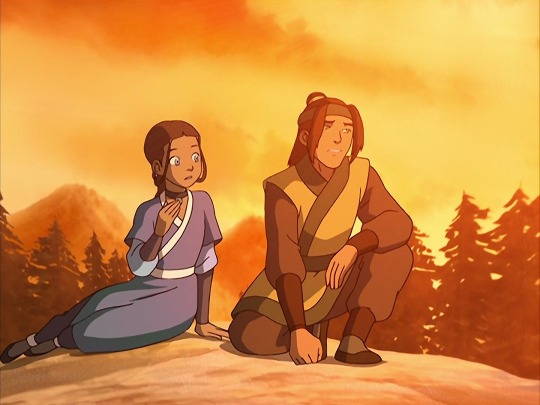
Haru: After the attack, they rounded up my father and every other earthbender, and took them away. We haven't seen them since.
Katara: So that's why you hide your earthbending.
Haru: Yeah. Problem is…the only way I can feel close to my father now is when I practice my bending. He taught me everything I know.
Katara: See this necklace? My mother gave it to me.
Haru: It’s beautiful.
Katara: I lost my mother in a Fire Nation raid. This necklace is all I have left of her.
Haru: It’s not enough, is it?
Katara: No.
This isn’t just a throwaway moment; it’s an important character moment that leads up to growth and the progression of Katara’s overall story, both in this individual episode and in the whole series.
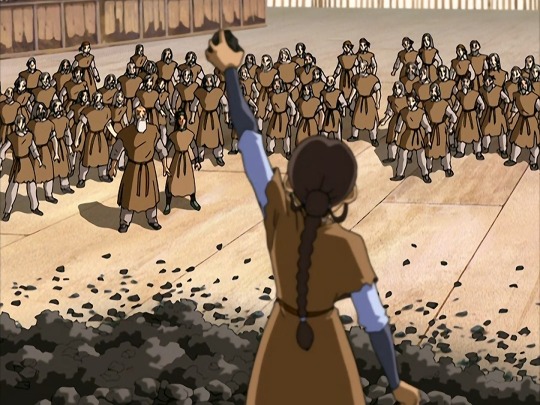
Katara finds her power in the connections she’s able to make with other characters. It’s a powerful driving force for her that makes her a strong character even before her bending abilities develop. Imprisoned was such an important episode to establish who Katara is and what her power is, and adds so much to her arc.
But there is one line in particular from the above exchange that also stands out: Haru says “it’s not enough, is it?” and Katara agrees. Even this early in the series, we’re establishing the fact that despite her drive and hopeful outlook, Katara feels deeply hurt, she feels a deep sense of loss that she opens up about to other characters in moments like these. But unlike Haru…Katara can’t go rescue her mother. Her mother is dead, and we see her grapple with that grief throughout the series.
Another character she reaches out to like this is Jet.
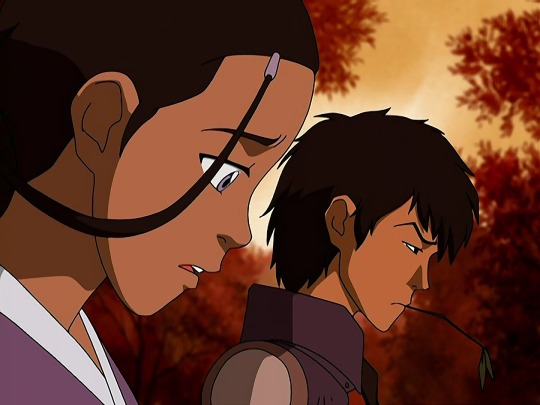
Jet: Longshot over there? His town got burned down by the Fire Nation. And we found The Duke trying to steal our food. I don't think he ever really had a home.
Katara: What about you?
Jet: The Fire Nation killed my parents. I was only eight years old. That day changed me forever.
Katara: Sokka and I lost our mother to the Fire Nation.
Jet: I’m so sorry, Katara.
Another important note about Jet is that there are explicit romantic feelings from Katara in this episode. Again, Katara empathizes with another character through a shared sense of loss. Sadly, in this case, Jet manipulated her feelings and tricked her into helping in his plot to flood the village…but those feelings were undeniably there.
That was the tragedy in this episode, but it also gives the audience so much information about Katara as a character: what motivates her, and what she wants. Katara is established as a character who wants someone who will connect with her and empathize with her over her loss—her greatest sense of trauma. She wants to help others but also receive support in return. The reason why she was smitten with Jet, beyond just initial attraction, is because he gave her a sense of that before Katara realized his true motivations.
A lot of people make the claim that Aang is good for Katara because he also feels a sense of great loss and trauma. And while on paper that’s true…does he really demonstrate that? I just gave two examples of characters Katara connected with this way, and both responded with deep empathy to what she said. Very early on in the show—the third episode—Katara attempts to connect with Aang the same way. How does he respond?
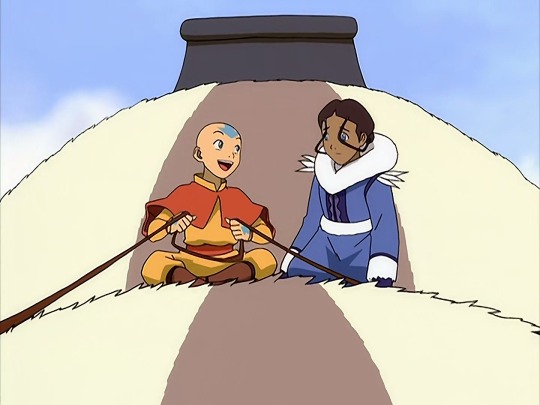
Katara: Aang, before we get to the temple, I want to talk to you about the airbenders.
Aang: What about 'em?
Katara: Well, I just want you to be prepared for what you might see. The Fire Nation is ruthless. They killed my mother, and they could have done the same to your people.
Aang: Just because no one has seen an airbender, doesn't mean the Fire Nation killed them all. They probably escaped!
Just compare this exchange to Haru and Jet. No effort to empathize, not even a “sorry for your loss” or anything. It’s a stark contrast, and the reason for that is because this narrative entirely centers Aang. Katara’s narrative always seems to be secondary to his when they’re together—which is exactly my point when I say this relationship has a fundamental lack of mutuality. It’s built that way from the beginning of the series. It does not add to Katara’s arc nor establish what about this dynamic would attract her.
And, look, before someone jumps down my throat about this…I’m not saying Aang is a horrible person for this response. I think it’s a sign that he’s immature and has a fundamentally different approach to problems than Katara. Katara is a character who has been forced to take on responsibilities beyond her years due to being a child of a war-torn world. Aang’s approach to problems is avoidance while Katara never had that luxury. It doesn’t mesh well.
This is all in Book 1. I honestly could have gotten on board with Kataang if the series meaningfully addressed these issues…but it didn’t. In fact, they actually got worse in some ways.
Back to Katara’s mother. We’ve established that this is a core part of Katara’s character and like in the scene with Haru, she indicates that this is an unresolved issue that pains her. But then, in Book 3, Katara actually does get a chance to confront this pain.
This would have been a powerful moment. Surely the character who is meant to be her partner, her equal, would have been there for her. Surely he would have understood and supported her, fulfilling her narrative and adding to her story.
But Aang didn’t do that. I won’t go into details because there are a million analyses out there on The Southern Raiders, but Aang’s response to Katara was the opposite of understanding. He got angry with her, insinuated that she was a monster for wanting revenge, and tried to dictate her behavior according to his own moral values. And importantly, from a narrative standpoint, he did not go with Katara. One of the most important events in her arc, and Aang didn’t support her—he actually tried stopping her. He didn’t contribute to her growth and development.
Also noteworthy:
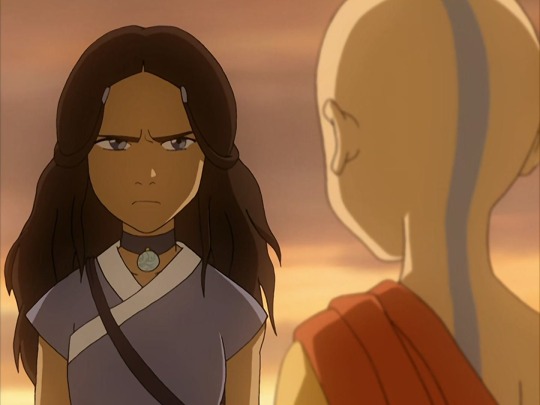
Katara: But I didn’t forgive him. I’ll never forgive him.
Even at the end of the episode, Aang clearly doesn’t understand at all what Katara is feeling. This line demonstrates it perfectly. He thinks she forgave him when that wasn’t the case at all…but of course, he didn’t even accompany her, so he didn’t see what actually took place. His worldview is fundamentally different from hers, and he’s consistently too rigid in his morality and immature to center Katara’s feelings.
Throughout Katara’s whole arc, her most significant character moments, Aang’s character just doesn’t come through the way Katara’s constantly does for him. Their narrative lacks mutuality. When Katara and Aang are together, she becomes an accessory to him. The ending scene is a perfect demonstration of this.
Now, to address the elephant in the room.
Which character does actually add to Katara’s narrative and support her growth as a character?
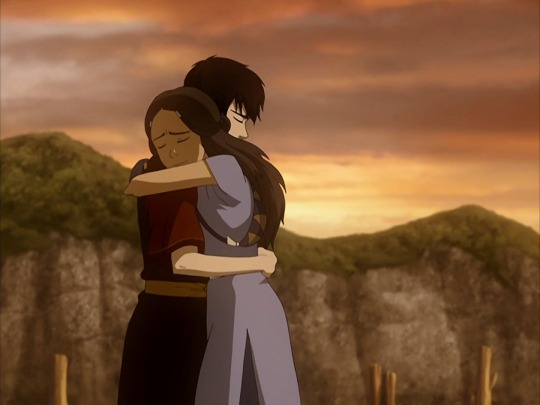
Correct! I just talked about how important The Southern Raiders is to Katara’s character and story, how it’s a chance for her to finally address the grief she’s been carrying since Book 1. And who stood by her side throughout this pivotal moment? Right—Zuko did.
You can talk all you want about how he’s a “colonizer” while Aang’s people suffered genocide, but you’re forgetting that “show, don’t tell” is one of the most basic aspects of storytelling. The fact is, despite how it looks on paper, Zuko was the one there for Katara at her critical moments. Zuko empathized with Katara more than Aang ever did—as demonstrated in this episode. Zuko never once brought up his own cultural values. Zuko never once told Katara what to do. Zuko’s position was that Katara should be the one to decide, and that he would support any choice she made. He supported her decision to spare Yon Rha, but he would have also supported her if she decided to kill him. I actually found this episode to be a satisfying reversal to what is typically seen in TV—for once, the female character is centered while her male counterpart takes the backseat and becomes a supporting role to her narrative.
Even before this, Zuko is shown to empathize with Katara.
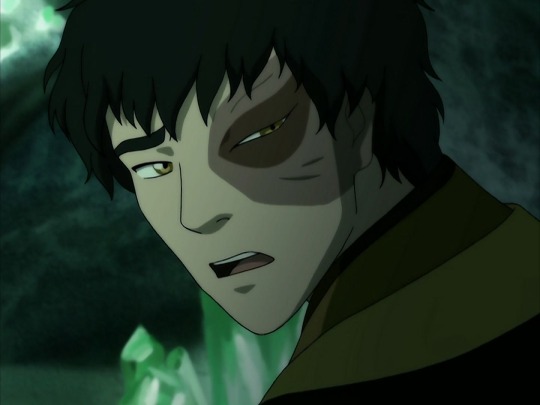
Zuko: I’m sorry. That’s something we have in common.
I think what gets me about this scene is the fact that he’s still Katara’s enemy, and she was just yelling about how she hates him and his people. But despite that, Zuko still empathizes with Katara. She is fundamentally human to him, and he expresses that to her in a way that allows them to connect. Zuko stands to gain nothing from this. It’s true that Azula entered the picture and twisted things around—but in this moment, Zuko’s compassion is genuine. His instinct was to respond to her grief with empathy, just like she consistently does for other characters.
And finally, how else does Zuko add to Katara’s arc?
I don’t think there is any more perfect of an example than the finale itself—the culmination of the arcs and development of all characters.
Zuko and Katara fight together. In a heartbeat, Zuko asks Katara to fight by his side against Azula, because he trusts her strength. She’s his equal—both in his mind, and in a narrative sense.
Then, this:
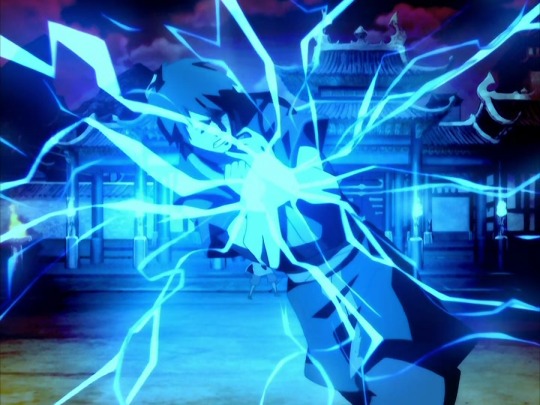
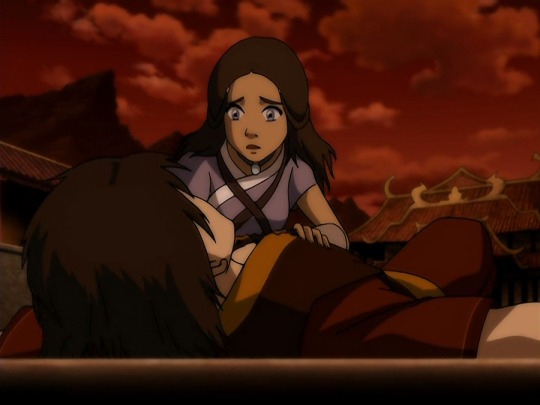
Both of their roles are so critical in this fight. They both save each other. The scene has such raw emotion to it. These characters were together at the conclusion of their respective arcs for a reason.
This is the perfect conclusion to Katara’s arc. She just played a critical role in ending the war that has caused her trauma her whole life. She just demonstrated her mastery of waterbending (another thing she’s dreamed of throughout the series) by defeating the world’s most powerful firebender during Sozin’s Comet. Even though she had help as all characters do, these are victories that belong to her and demonstrate the growth and power of her character. And to top it all off? She was able to save Zuko’s life. She didn’t have to endure the pain of feeling helpless to do anything while someone else died for her; this time, she had an active role, she changed her fate, and she prevailed. Zuko plays an important role in Katara’s story without dominating it. They perfectly represent mutuality. They add to each other’s stories. Their narratives become stronger when they’re together, without one diminishing or sidelining the other.
So, from that standpoint, that’s why I always see the attraction between Zuko and Katara and why I see it lacking between Aang and Katara. Zuko and Katara’s story doesn’t need some cheap little throwaway moments to shine. It’s integral to both characters’ stories. We are shown not told of the way these characters feel about each other. Given everything we know about Katara, her goals, her values, her past loves…absolutely everything points to Zuko being the true subject of her feelings.
Because let’s be honest. The ending I just described is so much more powerful and so much more Katara than seeing her being relegated back to a doe-eyed love interest for Aang to kiss. It hardly even made sense—Katara played no role at all at the culmination of Aang’s arc. She was relegated back to a love interest, rather than the powerful figure we saw fight alongside Zuko.
#zutara#katara#zuko#atla#anti kataang#canon critical#jet#haru#katara deserved better#aang critical#meta#analysis
682 notes
·
View notes
Text
Please excuse my initial reaction, I was quite distraught after reading his statement. Now that i’ve slept on the situation and have a more clear head i can say that i whole heartedly do not accept his apology for a few reasons:
1. One of us clearly remembers that night in excruciating detail. I will forever wonder what actually happened that night and that is something that weighs heavily on me. Although the next day i “accepted” that he would never hurt me, I no longer feel that way. It was a very fresh wound and I wanted to believe him because I still loved him. However, after two years of sitting on this and reflecting I take that back. And I felt like he was excusing his behavior by saying he didn’t realize how drunk I was. Also the fact that he shared it in such detail made me extremely uncomfortable. I respected him enough to not share such intimate details and he did not have the same respect for me. I think he could’ve just said “she initiated intimacy in the way she normally did” and it would’ve gotten his point across just as well. Regardless, he still had sex with me when i was blacked out while he was in a conscious enough state to assess and remember the encounter in such vivid detail. That fact has not changed.
2. All the stuff about his friends is frankly of no consequence to me. Everything that happened with Friend A happened while we were broken up. And him bringing up Friend B felt unnecessary given the fact that we all discussed the matter with each other at the time it happened. I never cheated on him and i would like to stop that theory in its tracks. Him and I have spoken about this matter privately on numerous occasions so that is all I will say.
3. About the shower thing, I was coming out of the shower/bathroom. He had the discord call on speaker on his phone. So yes, I heard very clearly what George said and Luke simply ended the call, he did not call him out. I believe he is recalling a different instance where another one of his friends said that he wanted to have sex with me once i moved to Florida. I was not witness to it and he did tell me he stood up for me that time which is why I didn’t bring it up. I did not go into more detail about it because I was just using that one quote as an example of how some of his friends would speak about me in his presence. However this is already more than one instance of his friends speaking about me in that way, which leads me to believe it happened quite often when I was not around.
4. Intentionally or not, I felt he demonized BPD and used that as a way to invalidate a lot of what I said
5. He still called me a slur when he knew it was wrong because I was getting cancelled for it at the time. I do not believe he was actually confused as to the gravity of what he said to me
I would like to remind you that i know him personally. I lived through that. When I say we remember things differently I mean it. I think that he believes he is being truthful. However because I know him and I know what I experienced, I do not trust him. I do not believe that we were “equally” toxic. While I admit I made a lot of mistakes in the relationship, to me they do not justify all I endured. I repeat, you can believe what you want. This is a very nuanced situation but if you were looking to me to accept his apology, I do not.
465 notes
·
View notes
Text
In my Zeus bag today so I'm just gonna put it out there that exactly none of the great Ancient Greek warrior-heroes stayed loyal and faithful and completely monogamous and yet none of them have their greatness questioned nor do we question why they had the cultural prominence that they did and still do.
Jason, the brilliant leader of the Argo, got cold feet when it came to Medea - already put off by some of her magic and then exiled from his birthland because of her political ploys, he took Creusa to bed and fully intended on marrying her despite not properly dissolving things with Medea.
Theseus was a fierce warrior and an incredibly talented king but he had a horrible temper and was almost fatally weak to women. This is the man who got imprisoned in the Underworld for trying to get a friend laid, the man who started the whole Attic War because he couldn't keep his legs closed.
And we cannot at all forget Heracles for whom a not inconsiderable amount of his joy in life was loving people then losing the people around him that he loved. Wives, children, serving boys, mentors, Heracles had a list of lovers - male and female - long enough to rival some gods and even after completing his labours and coming down to the end of his life, he did not have one wife but three.
And y'know what, just because he's a cultural darling, I'll put Achilles up here too because that man was a Theseus type where he was fantastic at the thing he was born to do (that is, fight whereas Theseus' was to rule) but that was not enough to eclipse his horrid temper and his weakness to young pretty things. This is the man that killed two of Apollo's sons because they wouldn't let him hit - Tenes because he refused to let Achilles have his sister and Troilus who refused Achilles so vehemently that he ran into Apollo's temple to avoid him and still couldn't escape.
All four of these men are still celebrated as great heroes and men. All four of these men are given the dignity of nuance, of having their flaws treated as just that, flaws which enrich their character and can be used to discuss the wider cultural point of what truly makes a hero heroic. All four of these men still have their legacies respected.
Why can that same mindset not be applied to Zeus? Zeus, who was a warrior-king raised in seclusion apart from his family. Zeus who must have learned to embrace the violence of thunder for every time he cried as a babe, the Corybantes would bang their shields to hide the sound. Zeus learned to be great because being good would not see the universe's affairs in its order.
The wonderful thing about sympathy is that we never run out of it. There's no rule stopping us from being sympathetic to multiple plights at once, there's no law that necessitate things always exist on the good-evil binary. Yes, Zeus sentenced Prometheus to sufferation in Tartarus for what (to us) seems like a cruel reason. Prometheus only wanted to help humans! But when you think about Prometheus' actions from a king's perspective, the narrative is completely different: Prometheus stole divine knowledge and gifted it to humans after Zeus explicitly told him not to. And this was after Prometheus cheated all the gods out of a huge portion of wealth by having humans keep the best part of a sacrifice's meat while the gods must delight themselves with bones, fat and skin. Yes, Zeus gave Persephone away to Hades without consulting Demeter but what king consults a woman who is not his wife about the arrangement of his daughter's marriage to another king? Yes, Zeus breaks the marriage vows he set with Hera despite his love of her but what is the Master of Fate if not its staunchest slave?
The nuance is there. Even in his most bizarre actions, the nuance and logic and reason is there. The Ancient Greeks weren't a daft people, they worshipped Zeus as their primary god for a reason and they did not associate him with half the vices modern audiences take issue with. Zeus was a father, a visitor, a protector, a fair judge of character, a guide for the lost, the arbiter of revenge for those that had been wronged, a pillar of strength for those who needed it and a shield to protect those who made their home among the biting snakes. His children were reflections of him, extensions of his will who acted both as his mercy and as his retribution, his brothers and sisters deferred to him because he was wise as well as powerful. Zeus didn't become king by accident and it is a damn shame he does not get more respect.
#ginger rambles#ginger chats about greek myths#greek mythology#It's Zeus Apologist day actually#For the record Jason is my personal favourite of these guys#The argonauts are extremely underrated for literally no reason#And Jason's wit and sheer ability to adapt along with his piousness are traits that are so far away from what usually gets highlighted#with the typical Greek warrior-hero that I've just never stopped being captivated by him#Conversely I still do not understand what people see in Achilles#I respect him and his legacy I respect the importance of his tale and his cultural importance I promise I do#However I personally can't stand the guy LMAO#How do you get warned twice TWICE both by your mother and by Athena herself that going after Apollo's children is a bad idea#And still have the audacity to be mad and surprised when Apollo is gunning for Specifically You during the war you're bringing to His City#That You Specifically and Exclusively had a choice in avoiding#ACHILLES COULD'VE JUST SAID NO#I know that's not the point however so many other members of the Greek camp were simply casualties of Fate in every conceivable way man#Achilles looked at every terrible choice he could possibly make said “Well I'm gonna die anyway 🤷🏽” and proceeded to make the choice#so hard that he angered god#That's y'all's man right there#I left out Perseus because truthfully I don't actually know much about him#I haven't studied him even a fraction as much as I've studied some of the other big culture heroes and none of this is cited so i don't wan#to talk about stuff I don't know 100%#Anyway justice for Zeus fr#Gimme something give me literally anything other than the nonsense we usually get for him#This goes for Hera too btw#Both the king and queen of the skies are done TERRIBLY by wider greek myth audiences and it's genuinely disheartening to see#If y'all could make excuses for Achilles to forgive his flaws y'all can do it for them#They have a lot more to sympathise with I'll tell you that#(that is a completely biased statement; you are completely free and encouraged to enjoy whichever figures spark joy)#zeus
211 notes
·
View notes
Note
I think the recent Cass and Jason discussion is very interesting bc like, Jason or even steph in her first appearance take these actions of righteous, murderous (or near murderous) justice bc of the fact that not only have they've been abused, but they're also able to recognise that fact, and feel that despite everything, they didn't deserve to suffer like that (Jason with his murder, Steph with her childhood abuse)
Whereas Cass struggles for most of her series to recognise that she was abused and struggles to properly resent her abuser on the grounds that she didn't deserve it. She resents David for being a killer and making her love him, for making her a killer, but rarely for the actual abuse that came with her training. She eventually recognises it right before the end of pre-52 in batgirl 2008, but not after a long time, and she still tries to save David at the very end after contemplating letting him die.
she does grows to resent Bruce after some time, and confronts him, showing that she's slowly gaining higher expectations for how she should be treated after developing relationships outside the batfamily (coincidentally with Steph, someone who can relate over having a shitty dad, along with her love interests like Kon and Tai)- though Bruce, despite his multitudes of bad parenting moments never truly abuses cass like david did, so there's nuance, and after her fight with bruce, she still has trouble fully reckoning with her abuse (still calls david shooting her 'a game' in front of tim- she knows its wrong but still doesn't act upset about the fact it happened to her).
She kind of sees all the training she went through as a necessary evil in order to have the skills to be a hero- which is somewhat true, but I think it also contributes to her being unable to see herself, even partially, as a victim for large portions of her narrative.
She can understand abuse as something that molds you into a killer, she can't understand being abused and then choosing to be a killer bc of the righteous fury you have at what happened. In Cass' mind her abuse is synonymous with killing. That's the worst thing Cain ever did to her and the reason she ran away. She can't understand someone like Jason choosing it as a way to cope/deal with abuse.
I don't think this is necessarily a ground breaking thought but I think abuse is an interesting lense to look at both Jason and Cass' stories- pre52, Jason's story is about continuing a cycle of abuse. Criminals hurt him, he hurts criminals, and anyone who gets in his way of hurting the criminals, bc even tho he pursues justice, he also pursues retribution, which is hard to do justly. Between that and the whole zombie/living ghost thing, it's downright gothic. Whereas Cass' story is about breaking out of a cycle of abuse- nobody dies bc she let one person die and will never let it happen again. It's just an interesting way to view their differences I think. Good Cass and Jason posts recently!
I LOVE THIS!! I absolutely think abuse informs the way Jay and Cass see the world (and Steph - Steph, in many ways, is the median point between Jason and Cass).
It's the fundamental question that drives Jason and Cass apart. For Cass, her question is: how can I be the victim if I'm the villain? And for Jason, the question is more: how can I be the villain if I'm the victim?
I love this line: "Cass struggles for most of her series to recognise that she was abused and struggles to properly resent her abuser on the grounds that she didn't deserve it." This is doubly complicated by the genuine love David Cain had for her - that panel of them watching the stars kills me every time. This is another key difference between Jason and Cass' abuse (taking Jason's abuse to be his death) - Jason had no love for the Joker, but Cass did love David Cain.
It's why it's so easy for Jason to want to kill the Joker, and so hard for Cass to even be angry at her father. And your point here - "In Cass' mind her abuse is synonymous with killing" - is absolutely on point, because Jason's conception of abuse is the helplessness of being murdered. They are both acting in ways to prevent what abuse means in their minds: as Batgirl, Cass will never have to kill again, and as Red Hood, Jason will never have to be helpless in the face of murderers again.
Any rebuke of their moral codes feels like a denial of the abuse they suffered. It's why Cass can't allow others to kill, and why Jason can't accept Bruce's reasoning for not killing the Joker. It's why these versions of them could never get along. Argh there's been such good Cass and Jason commentary recently, they drive me insane!!!
#cassandra cain#jason todd#damn people are popping off with their analyses#i love this one because cass' denial of her abuse is underdiscussed#she can't hate david cain because she hates herself most#and yeah i think her worldview is very limiting not just to herself but to people like jason#stephanie was very integral to cass coming to some sort of acceptance about what david cain did to her#like cass' ability to relate her experiences to steph's dad is HIGHLY important to cass' healing i think#BUT THEN STEPH DIED#war games you will always be AWFUL
149 notes
·
View notes
Text
Warhorses: Which horses are actually good candidates, anyway?
This post is in honor of @warrioreowynofrohan, who asked the question in the comments under my guide, "Horses: Since There Seems To Be A Knowledge Gap". Their question, "Given what you said about too much weight breaking a horse’s spine, how did that work with knights in plate armour?" is one I'm going to try to answer here, since the answer can be very nuanced depending on where and when you're talking about.
Also, while I was a stable hand for years as well as a rider, I never had the opportunity to directly learn more ancient styles of tacking, horse training, and combat, so I don't have any direct experience to draw from with regard to horses used for military purposes. I'm still gonna do my best here with what I know, and research what I don't.
As I've covered in the past, large horses (draft horses) make less-than-ideal warhorses, and so do carriage horses like the elegant and dramatic Friesians.
Let's begin by addressing this from the perspective of creative writing. For you writers and content creators out there, an essential part to the continuity of any historically-themed work you do involving horses will be depicting breeds of horses that didn't exist before a certain time in history. I'm going to approach this question from the stance of, "Medieval-type era warhorses". Horses were used in warfare as late was World War II, but actual horses you ride into battle with knights and archers and bannermen? We actually have to drop the subject of specific modern breeds altogether aside from using them for comparisons.
When discussing warhorses, various cultures have approached them differently. Some cultures will value a specific type of horse above all others, such as the Mongolian Steppe Horse or the American Mustang. Other cultures, which may be from biomes and territories where multiple types of horses are needed for different forms of warfare and tactics, value whichever horses can get their jobs done without their riders getting killed.
Carrying vs. Pulling:
Horses have been used in warfare since as far back as 4000 BC, but their first applications were more as chariot horses. Humans have been riding and working with horses since before we even had stirrups to more easily ride them with! As archaeologists and anthropologists make more discoveries, the more we learn that we humans have been working closely with horses since before we had specialized tools to ride them with. The very first warhorses pulled chariots or carts, which is much easier for a horse's anatomy to handle compared to carrying a heavy weight like an armored rider on their backs, which puts stress directly on their spines where they have very little supporting muscle for supporting a lot of heavy downward weight.
Warhorse Size Categories:
Really, any breed of horse can apply to a niche in warfare if it's needed enough. Even very small, delicate horses have had their place in the history of human combat! Before I continue, it's important to know that there's a unique unit of measuring a horse's height. Rather than measuring a horse's height in centimeters or inches, they're measured in units called "hands". A single "hand" = ~4 inches/10.16cm, and a horse's height is measured based upon the distance between the bottom of their hoof to the tallest part of their shoulders, just at the base of the back of their necks. We don't actually include neck length/head height in a horse's measurements with traditional measuring.
Another rule of thumb: The average horse cannot safely carry anything heavier than about 30% of their total body weight. This is a serious factor to take into mind when deciding on a type of or breed of horse for a mounted warrior of any kind: You need to factor in the OC's starting body weight, and then add on the weight of armor, weapons, and any armor the horse itself may wear along with the weight of its tack.
Light-Weight Horses:
A few examples of lightweight horse breeds whose ancestors have historically been used in combat are Arabians, Barber Horses, and the magnificent Akhal-Teke. Lightweight and delicately-boned horses like those are best applied for military maneuvers that require precision, speed, and endurance, and the rider themselves should specialize in some form of combat or reconnaissance that doesn't require them to wear heavy metal or laminated armors. Archers are good candidates for riding smaller horses, or lightly-armored swordsmen like an Ottoman Janissary.
Central-Asian and North African horses also benefit from having a higher tolerance for hot climates. They can absolutely suffer from heatstroke and cardiac arrest from being forced to run and work in extreme temperatures and should always be provided with the same protective measures in a heatwave as any other horse, but they have a little bit of an edge over horses descended from freezing and temperate climates.
Medium-Weight Horses:
Medium-weight horses started showing up in the archaeological record around about the Iron Age, where chariot warfare was becoming an increasingly utilized form of mobile combat, and people needed bigger, stronger horses capable of pulling heavier loads - such as a chariot with two passengers rather than just one. As cultures began to develop heavier-duty armors made of metals and laminated materials, it also became important to breed horses that were tall and stocky (muscular and with relatively short spines compared to their height), and therefore more capable of carrying riders in increasingly heavy armor. Medium-weight horses were also essential at the dawn of the gunpowder age when the cannon came into use in siege warfare for pulling the heavy, iron cannons into position.
Medium-weight horses are really where we see the beginnings of knights and other warrior classes on horseback come into the forefront of warfare. When you have a horse that's big and strong enough to carry heavier armor and heavier weapons along with a rider wielding them, you have a much deadlier force at your disposal. Strikes from a sword or spear from the back of a galloping horse basically results in a sword capable of cutting through enemy soldiers like a hot knife through butter.
Important Note: Traditionally, cavalrymen wield blunt swords when attacking from a charging horse's back. When a horse is charging at full speed, the sharpness of a blade becomes less important than the blade's ability to stay in one piece when it impacts hard armor and bone. A blunted edge basically turns a cavalryman's sword into a thin club that's better at holding up against smashing through multiple layers of armor and bone compared to a thinner, more delicate sharpened edge that can shatter from a high-speed impact.
Heavy-Weight Horses:
The direct ancestors of modern draft horses, such as the Shire Horse, only began to appear around about the beginning of the European Medieval Era, and were far and away not even close to the enormous sizes of the draft horses we have today. Any horse counts as a "Heavy-weight" classed horse if its weight exceeds 1500lbs/680kgs.
Heavy-weight horses were really more bred for pulling enormous weights rather than carrying knights. While yeah, there is some evidence that suggests that heavy-weight horses were used by heavily-armored knights, historians argue a lot about whether it was a rule or an exception (such as with Henry VIII, who continued to ride well after he had begun to weigh more than 350lbs/158kgs, and even went to war in France in his final years on horseback). Generally speaking, medium-weight horses tend to be the right balance of agile and strong for carrying someone that's going to actively be fighting. Heavy-weight horses were bred to be a lot more tolerant to the chaos and frightening stimulation of the sounds of battle, but medium-weighted horses generally tended to be more suited to moving efficiently through dense packs of soldiers and weaving around other horses.
Ponies:
While actually being the smallest class of warhorse, ponies were essential when it came to carrying cargo and working as pack-horses. In certain forms of terrain, such as mountains, large horses pulling big carts full of supplies or soldiers could often be extremely impractical. In situations where an army needed to move on foot and form a narrow line in order to travel, ponies were able to traverse much narrower and rougher terrain while carrying smaller loads to their destination, when heavier horses would struggle more under their own weight and dexterity.
Europe-Specific Terminologies:
If you're a writer reading this and writing a piece set in the European Medieval age, there are specific terms used for the different classes I listed of warhorses above that I'm gonna list:
Destriers: The Destrier was a universal term for the iconic knight-carrying, jousting horse. They were also sometimes referred to as "Great Horses" due to their reputations in combat settings. Destriers could have just about any appearance, but were rarely taller than 15.2 hands, or 62inches/157cm. They were capable of carrying heavily-armored knights (although knights in full plate mail rarely rode into battle and stayed on the horse the entire time - they tended to specialize at grouping up and killing a lot of footsoldiers swarming them at once and preventing breaks in defenses from being overwhelmed by an oncoming army; in the case of Edward the Black Prince, we have substantial evidence in the form of his surviving brigandine that a mounted soldier or knight was more likely to wear chainmail and brigandine with a tabard on their body with their arms, feet, and heads the most heavily armored in plate when they intended to fight on horseback, making them a little lighter and more maneuverable, but I may be waaay off base there because I'm thinking of more of Italian soldiers who used full plate and how they applied it in battle more than any other example) and wearing armor themselves.
Interestingly, the sex of a destrier was often chosen strategically. Stallions (horses that haven't been neutered) are more aggressive, and could both act as combatants on their own if their knight was dismounted or killed, but could give away an army's location if they were attempting to move stealthily. Stallions whinny and shriek a lot when they're horny or arguing with each other, which is most of the time.
Mares were often chosen by Muslim armies for being much less vocal, and therefore much more capable of stealth. Geldings (neutered males) were the preferred mounts of the Teutonic Knights, a Catholic military group, since they couldn't be stolen and used to breed more horses for the enemy army.
Coursers:
Coursers were the most common Medieval European warhorse. It's important to remember that in Medieval Europe, most armies were almost entirely comprised of common men - serfs subject to the will of their landlords, not far removed from slaves in many ways - who couldn't afford the highly-prized and expensive Destriers. Coursers were usually a bit lighter than Destriers, but were still strong enough to carry someone wearing armor. Coursers were also a little more utilitarian, because they were also sometimes used in hunting as well as warfare, so they had a valuable use outside of warfare that the owner could benefit from.
Rouncey:
A rouncey was an all-purpose horse that could be used for leisure and travel-riding as well as be trained for war. They were a lot more likely to be found on the farm of a serf or independent farmer of some kind, as they could fill a lot of different roles depending on what they were needed for. Their sizes weren't really important as much as their ability to get the job done.
It's also critical to remember that, when talking about warhorses, we're usually talking about eras long past. In general, thanks to resource availability and incredible advances in medicine, modern humans are significantly taller, and therefore heavier, than people from the European Medieval era and prior. While fatness was valued in many cultures for its suggestion of wealth, most working-class and serf-class people worked intensely physically-demanding daily lives just to maintain their own homes. They were a few inches shorter on average than we are today, had greater fluctuations in body fat distribution depending on how harsh or bountiful the harvest season had been and the season in which a war was taking place (the average person's weight would swing by 30lbs or more on average every year prior to the industrial era), and cavalry were usually chosen based upon skill in the saddle as well as physical size when considering the application of medium or heavy armor being placed on the horse's back and body.
246 notes
·
View notes
Note
Hi Miss Raven! I was reading your opinions about Leona and wanted to ask you, do you think Leona would be a better king than Falena?
[Referencing this post!]

Put simply, no--but not for the reasons you're probably thinking. Hey now, hold on! Put down your pitchforks and torches! Please at least hear what I have to say and consider it.
It's not that I think that Leona is incompetent or that I think Falena is sufficient as a king. It's that ruling (especially as a monarch that has a LOT of power and control) is very nuanced and to say that one person would be "better" than another is grossly glossing over all that goes into governance.
This post gets quite long, so I've placed all my thoughts under the cut. Again, I ask that you read the whole post before commenting.
First of all, the baseline we're comparing to is Falena so let's review what we know about him that's relevant to this discussion. Leona describes Falena as someone who has a "carefree attitude". Because of this, Leona worries that Falena will "run [their] kingdom into the ground." Now something I want to make clear: "[running their] kingdom into the ground" is very harsh wording used ONLY in EN. In JP, Leona is much more casual with his phrasing. He simply expresses that he is "worried about the country's future", not that he thinks Falena will ruin it:

In the book 2 post-OB flashback sequence, Leona implies that his older brother can sing and nap but still be guaranteed the crown because of Falena being first-born. Falena is noted as holding a ceremony in honor of his son's birth; he had commissioned for a fountain to be built (even though water is a scarce resource in their land) and unveiled in their capital—an occasion which Leona skipped. He refers to the ceremony as a "self-indulgent party where you show off your son to the people." This characterizes Falena as a jovial and excessive person who doesn't think too deeply about policies. Another example of this comes from Leona's Birthday Boy vignettes, in which Falena sends his younger brother an expensive rug. "In the time he spends sending me gifts I don't even want, he could be sending rugs to neighboring lands and bolstering our foreign relations," Leona says. "Of course, the thought never even crosses his mind." One of the Sunset Savnna’s driving philosophies is “hakuna matata”, which, as Leona describes it, means, “don’t think too hard about things”. And indeed, if Falena is anything like how Leona says he is, then he is the walking embodiment of their country and their beliefs.
One major issue that is unique to their homeland is that of unification. The Sunset Savanna boasts many different kinds of beastmen, each with their own customs and cultures--and because of that, these beastmen tend to live in settlements of just their own kind and don't always get along or see eye-to-eye with others. For example, it is said that very few bird beastmen reside in the capital city and Ruggie has implied that hyenas are low in the social hierarchy. Kifaji, the grand chamberlain, confides that the acting king Falena has struggled with this unification. The Kingscholars' father has communicated that he would like for nothing more than Leona to lend his assistance to Falena for this endeavor. (Keep this in mind, as I will be touching upon this again later!)
What I think many people tend to overlook when it comes to Falena's rule is that he has not been in power for a long time. According to Tamashina Mina, Falena has only been running the country for "the last few years", which is NOT that long. Falena has not even had that much experience as the official head of state to begin with--and yeah, you could argue that he has been preparing his whole life to eventually become the ruler, training for it and actually doing it are very different beasts. No amount of tutoring will prepare you for having the weight of an entire nation suddenly on your shoulders. I would also argue that anyone that is new to a job won't do the best right away and that experience is the best teacher. Falena is likely still learning while on the job and trying to do his best while also juggling being a parent and husband, trying to reach across the aisle to his estranged younger brother, and looking after his ill father.
This leads me to another point: a lot of what we hear about Falena is coming from Leona's perspective, which is very biased (especially in the post-OB flashback, as this was when Leona was at his most bitter). We should be aware of this while taking in the information Leona is offering. I don't doubt that Leona's telling the truth about how his brother is carefree or the things his brother has done, but at the same time we need to realize that this is a limited view of Falena. It's not the whole picture of who he is. Leona tends to focus on his brother's shortcomings and downfalls--but thinking about it, what are Falena's strengths?
Well, one of them is definitely that Falena is friendly, kind-hearted, and honest. Even Leona confesses to this. However, he frames these traits in a negative way, stating that "[Falena] could just focus on the kingdom's affairs--you know, his JOB--but nooo, he's gotta be the caring big brother who's nice to everybody," and, of his honesty, "he just makes things harder for himself." Falena also seems to be positive and insightful--admirable qualities in a leader. When Leona speaks rudely to him, Falena tries to reassure his little brother: "You may never become king, but you are still wise. There is much you could do for this country." He even pursues Leona when he leaves, trying to get his little brother to see reason. Falena sees the potential in Leona and he wants Leona to realize that potential too. If you look at this another way, this personality can be a boon. It could make it easier for Falena to smooth over tensions and get other political figures to open up to him, similar to how Kalim’s empathy helps to uplift and support his dorm mates and how those dorm mates in return give him their loyalty.
Finally, we know that Falena is cognizant of the culture and the values of the Sunset Savanna and likely works in accordance with those. If we revisit Tamashina Mina, Leona talks at length about how some areas of the country are so underdeveloped that its people are still drinking rainwater or from wells. He laments the situation and says that if only they improved their infrastructure and mined the valuable ore their country has, the people would be able to live better lives. Leona here leans pro-industrialization. From the lack of industrialization we see in large parts of the country, we can assume that Falena does not have this same stance. Rather, Falena understands that the people of the Sunset Savanna cherish living in harmony with nature and want to honor their animal ancestors by living in this way. He KNOWS that their people would be against industrialization, and so he favors slower development (Sunrise City being one of these metropolises that developed under the rule of their father) and in ways which preserve nature. As Lilia puts it, “Developing is easy. You just throw money at it. But building a city like this, while still preserving nature? That’s the real challenge, I’d say.” (That was a very quick summary but if you're interested in reading more about this topic specifically, I'd recommend this post!)
Falena cares about tradition and upholding it, and there isn’t inherently an issue with that. He values where he comes from and the practices that come with that. That’s why Falena gets upset with Leona for not doing his duties and skipping out on important meetings. It’s not purely that Falena sees these acts as disrespectful (although let’s be clear, it is disrespectful), but it also comes with the sadness of knowing that his younger brother doesn’t see the value in the same things he does—yet he still understands that Leona has his own strengths that be brings to the table.
You can see how this could translate into his ruling style too, even if it is not explicitly stated in the game. Falena is someone who is easy to approach with your problems (let's assume that this is the case both for his own people and for diplomats of other countries). He is someone who cares about tending to everyone, which would make him popular with the public--but that means he may spread himself or their resources too thin. Falena is also for slower progress in order to respect the ways of their culture and their people's values. He sees value in hearing others out and working in teams, even pleads with Leona to join his bureaucracy. But the point is, Falena cares, and all Leona sees in that is a bleeding heart since it doesn't produce what Leona thinks are good results.
And speaking of Leona, it's about time we get to him. What are his qualifications in a situation where he was king? What would his ruling style be like, and who would it serve his country?
Firstly, it's worthwhile to compare Leona's thinking to Falena's. Unlike his older brother, Leona is proactive--he plans ahead and considers the political power in something as simple as gifting an item. Many of the ideas he proposes for bettering his country are things that Falena either never thought of (ie gifting the rug to another country instead of to him; Falena sees spelldrive/magift as a national sport but Leona thinks they can drive up tourism with an elite team for the world league) or would refuse to implement out of principle (speedrunning mining operations). However, it's undeniable that Leona's methods would produce results. As he demonstrates to us with his shady tactics in books 2 and 3, it does not matter to Leona what he has to do in order to achieve what he desires. His eyes are set on the goal, not on how he gets there (though he will plan the steps out meticulously as well). He's willing to tear up the environment if it means enriching the Sunset Savanna's economy and providing clean, consistent drinking water for the citizens. It's ultimately gains, but it jeopardizes maintaining harmony with nature. This would earn him genuine ire from his people (and honestly, disliking someone for blatantly disregarding your beliefs is valid; it's not blindly being petty or hating Leona for being the "lowly second born"). But!! Leona as of book 7 says he is going to intern at a mining and energy lab in his home country. This implies that he is willing to learn about the field and may use that knowledge to enact sustainable change. This is a really good start to his development and growth into a wise leader.
The brothers' personalities are also not alike at all. Leona is... admittedly far more abrasive that Falena. I'm not saying that Leona would behave so rudely to politicians or on a global stage (please, the man has more tact than that), but he would carry himself very differently than Falena. Leona can be polite and speak fancily all he wants, but he still does not have that same approachable warmth to him. Something else we should consider is that... well, Leona doesn't like stuffy occasions or putting on airs, which would basically be expected of him as king. We don't know for sure how he would act if the circumstances ask that he be cordial and yet the man himself detests such a thing. He could play the part if needed, sure. But for how long before he becomes annoyed or tired of it? Leona can also be arrogant and demanding. Do you think he would skip/sleep through meetings with advisors he deems irrelevant or unproductive? (Recall how he skips ceremonies and traditions he deems unimportant or boring, like the celebration of Cheka’s birth and tries to cheat his way out of his responsibilities as Captain of the Sunset Warriors. He also skips classes, deeming school largely unnecessary for him because he thinks he already knows everything.) How do you think he'd act with people who oppose him? Would he defy traditions? He also disregards the “hakuna matata” mantra and cynically labels it “self-serving”. I could see how tensions could rise as a result. (Reminder that I'm not saying it's for CERTAIN that Leona would do these things, I'm just posing possibilities based on what I understand of his character and whether you believe Leona would act like this or not is up to you.) Leona is 10 years younger than Falena and has never formally served in a governmental position. This means that he, too, lacks the political experience to be king. Some would say that where Leona makes up for this is in life experiences. He has been downtrodden and defeated, mingled among the common folk, etc. This means Leona is better equipped to understand the plight of his people, they argue. And I can see where people are coming from--but personally, I think Leona still lacks what he needs to be a "better" ruler. Yes, Leona has lived "out there", but the fact remains that Falena still has 10 years on him. What's more is that Leona has not actually strayed that far from his privileged life. He's dorm leader (a position of power within NRC), attends an elite magic school, and constantly has Ruggie taking care of him. I don't think this really prepares him to rule a whole country.
That's a good segway into Leona and his leadership. As I've mentioned before, Falena is having trouble with enacting national policies to unite all beastmen. Leona does not appear to have the same issue, as even though there is a variety of beastmen within Savanaclaw, they all defer to Leona the same. Therefore, Leona, as king, could easily resolve this problem in the Sunset Savanna--so the theory goes. As for me, well... In my opinion, I do think it's a show of skill that Leona can get many different beastmen rallying under his flag but I don't think this generalizes to (again) the scale of an entire nation. Not only do we have to account for WAY more people, but also people of demographics that differ wildly from Savanaclaw. The mobs under Leona follow him, yes--but thinking about it, they're all VERY similar demographics-wise. They're roughly the same age, all male, all students, and have the same goals in mind (for book 2, it was to be noticed by talent scouts). I would bet that most of them are from middle class or upper-class incomes too. Now expand the scope to a country. Do you think Leona could appeal to young and old? Male and female? Rich and poor? People of all occupations? What about parents? There are so many other factors to account for, so I don't think it's fair to generalize Leona leading a dorm of maybe 85ish (this is just a guess; NRC has ~800 total students, 600 are on-campus and split across 7 dorms so this assumes equal splitting) to a diverse kingdom of thousands. We also have to consider that the rules that govern NRC don’t translate to the real world. At NRC, power and individualism is what is valued—both of which Leona has in spades. Are those same things valued in his kingdom? No, be is feared for his power and can’t realistically accomplish the things he wants to on his own.
I want to point out another glaring weakness of Leona's: because of his pride, he has trouble sharing power. While Falena is okay with working with others, Leona hates to be challenged. He doesn't have a vice dorm leader because he doesn't want to butt heads with someone else about how to rule. He shuts down Epel, who asks him about strength training and tells him to focus on speed instead, because that's what Leona sees as Epel's best asset. He scoffs at the idea of listening to individual complaints and thinks there would be a more efficient way of handling them. Leona generally lacks his brother's empathy and would rather maximize efficiency by allowing himself to be the only one calling the shots. We get a glimpse of Leona relinquishing his power as dorm leader to Ruggie in book 6, but that's only because Leona physically cannot be present to rule. This could be an exception, or just the first step in Leona shifting to adapt to working in a team.
If Falena were to abdicate the throne to Leona right this second, no, I don't think Leona would be fit to be king. Leona's ideas seem "good" on a surface level, but that's ignoring the long-term impacts and his less-than-stellar personality quirks. He has a ton that he has to learn before he can comfortably govern. At the same time, Falena isn't exactly a perfect ruler either. He, too, lacks experience and can be short-sighted and naive in spite of his good intentions and willingness to hear everyone out.
In an AU where Leona was actually the crown prince (and thus never got talked down to or treated like the “lesser” second born), maybe things would be different. But then that creates the same issue with Falena (now the scorned younger prince) being the "Leona" of the AU.
Each Kingscholar brother has his own strengths and weaknesses, perspectives, and leadership styles. THIS DOES NOT MAKE ONE SUPERIOR OR "BETTER" THAN THE OTHER. Instead, they make up for one another's deficits or flaws, creating a more well-rounded and unified view. This is, perhaps, why both Falena and their father want Leona to step in and help with ruling the country. I think they all see the benefit that Leona could provide and that they value his thoughts.
The "best" situation for the Sunset Savanna, in my opinion, would be Leona and Falena working together to see the country's future through. It does not have to be in the capacity of king and advisor; titles do not matter here. What is most important is that Leona and Falena can meet on neutral grounds and agree to put their all into improving the Sunset Savanna.
#twst#twisted wonderland#Leona Kingscholar#Falena Kingscholar#Farena Kingscholar#Cheka Kingscholar#Kifaji#Neji#disney twisted wonderland#disney twst#notes from the writing raven#question#twst en#twisted wonderland en#twst analysis#twisted wonderland analysis#twisted wonderland character analysis#twst character analysis#tamashina mina spoilers#leona birthday boy vingette spoilers#book 2 spoilers#Ruggie Bucchi#Lilia Vanrouge
293 notes
·
View notes
Text
How To Fucking Write: a guide by fairyhaos

this post details:
ENEMIES TO LOVERS

hi gays and gals! "how to fucking write" is back after a longgg hiatus ^^ this time we're discussing enemies to lovers which is, i think, a universally loved trope! please do send an ask if you have any requests for what i should write advice for next, and do reblog this post if it was helpful for you :)

# - HOW TO WRITE ENEMIES TO LOVERS.
.. bullet point one : choose your e2l
the most important thing when starting is figuring out what type of enemies to lovers you’re writing about. this is mostly semantics: lots of writers/ advice givers will tell you that there’s only one real enemies to lovers (when they’re literally enemies) but personally, i believe that “enemies” can be used as an umbrella term for loads of different relationships.
figure out what kind of “enemies” your characters are. this is by no means an extensive list, but enemies to lovers can include:
literal fighting enemies
(academic) rivals
2 people who snipe at each other a lot
betrayed(????) by one another
…and many other types.
figuring out in which way they’re enemies helps write out their dynamic, and also setting.
for example, you’ll often see type #1 used in historical, fantasy, battle or mafia settings, where there will be two “sides”, either due to family feuds, country/ kingdom feuds, etc., so their dynamic often feels more serious and more emotionally charged due to history and/or ancestral beliefs that they’ve grown up with.
it’s often seen as the “truest” form of enemies to lovers, because the characters interact with the intention to genuinely hurt each other. this will therefore affect the way you write them, since it has to seem like there is genuine, mutual animosity between them.
example : [court of lies on ao3] — taegyu, enemies to lovers

(holy fuck this is such a bad example but) as you can see, enemies to lovers works well within historical settings, since themes of betrayal, bloodshed and battles lends itself nicely to the trope.
knowledge of how to write fight scenes can be quite useful (fightwrite.net helped a lot with writing mine), along with making sure that dialogue uses action tags that showcase the characters’ emotions.
type #2, on the other hand, most likely takes place in universities, high schools, and sometimes in offices, where academics are important and it’s less about trying to hurt one another, and more about being royally pissed off by the other person’s presence.
there are certain nuances to how the characters interact depending on what kind of enemies to lovers situation they’re in, which is why it’s important to figure that out first.
.. bullet point two : figure out the why .
next, try to find out the why. why are they enemies?
it is imperative that you explain their situation to the readers and make them understand why the characters are enemies, and most importantly, why they can’t get together right now. enemies to lovers often goes hand-in-hand with slow burns for exactly this reason.
are they enemies due to clashing beliefs? a certain incident that happened between them, or to someone they know? maybe it’s just repressed feelings?
for every type of enemies to lovers, and for their subsequent settings, there’s often a set list of reasons that most writers use to explain why they’re enemies.
historical settings often have some sort of feud taking place, or a betrayal. academic rivals focus on, well, academics, but social factors of popularity are often used. and “enemies” who snipe at each other often have very superficial reasons that they dislike one another, such as a bad first meeting or a misguided impression of personality.
the reason doesn’t particularly have to be something as dark and deep as convoluted morals or someone killed someone else’s father. they still need to overcome their enemy relationship and become lovers, after all.
but having a reason helps your readers feel more comfortable that the story will go somewhere and that there truly is an obstacle that’s preventing your characters from getting together at the very beginning. and if that reason is an interesting one, then… well, all the better, i suppose.
.. bullet point three : the friends part
for a good enemies to lovers that has your readers truly invested in the story, the lovers potential has to be there too, even when they’re enemies.
the characters also have to have respect for each other, above all else. if the situation becomes dire, they need to be able to understand one another’s views and work together, or at least recognise that they share some ideas and have moments where they get along.
this will a) make the transition from enemies into lovers more natural and b) create the tension that makes e2l so popular.
the best ways to show these moments are by having scenes where the characters have no choice but to work together, and in that time, begrudgingly admit that the other person isn’t as bad as they first thought.
it could be a group project, them fighting for the same cause for once (against a corrupt/ unfair policy), having to get along briefly due to mutual friends, or any situation where they have to act amicably for once and, most importantly, learn a little about one another in the process.
okay, but yena, how can i write those scenes? what can i do to create that tension?
describe certain actions, mannerisms, and the way that they speak to each other that showcase acceptance and positive emotions. this can come in the form of:
lingering eye contact
them agreeing on something
smiles!!!!
a pleasantly surprised inner monologue
dialogue being more lighthearted
A doing something for B without being asked
(this is extra hard mode but) creating an inside joke
…and whilst it is a little shallow, an acknowledgement of the other person’s attractiveness always works really well, too.
example : [my other e2l taegyu fic on ao3]

as a rivals to lovers fic, their dynamic already started off more playful than in the other example i showed, but you can see that their conversation is more teasing, as they become more comfortable with talking to each other normally.
the term “enemies to lovers” always felt a little weird to me, because it’s important to remember that it’s often more like “enemies to friends to lovers”, because the characters need to develop a liking of one another first before they can think of themselves in a romantic relationship.
.. bullet point four : the oh moment
why do they become lovers in the end?
what is the tipping point? what makes a character realise that they’ve fallen for someone they once believed to be their mortal enemy? do their feelings hit them all at once, or is it a slow build up? and what are they going to do about it?
enemies to lovers lends itself very nicely to the feelings-hit-me-like-a-truck trope and the iconic oh moment. writing the inner monologue is a good way to showcase the exact momene the penny drops. for example, i have a loose “formula” that i like to use when writing oh moments (whether they’re in e2l fics or not):
[dialogue/ action of B as A watches them]
[inner monologue of A showcasing fondness for that action]
[inner monologue of A recognising how their feelings changed over time]
[action from B that solidifies overwhelming fondness and has A surprised by their feelings]
[the oh / oh no moment as the penny drops and A realises what this means]
this is by no means the only way to write out a “feelings realisation” scene, but it works very well, because the inner monologue can use varying sentence structures and a bunch of metaphors and figurative language to build anticipation.
example [venus and sun on ao3] — seoksoo, friends to lovers

this extract essentially follows the outline i described, and seokmin’s acknowledgement of joshua as sweet refers to how he had previously known little about him, merely referring to him as “nice” before their relationship gradually built up to that moment.
for a really effective oh moment, the characters need to have a chance to reflect on how their relationship has developed. they need to be able to notice their growth and draw their own conclusion from there.
.. bullet point five : be careful .
finally, some precautions.
with enemies to lovers, the whole attraction is the tension between the characters, the original animosity that is actually hiding their repressed feelings. but they still have to fall in love at the end, despite what they put each other through.
do not make them do something that they can’t take back.
this is quite important with enemies that physically fight each other. giving near-fatal injuries, or paralysing or physically disabling them (again, fightwrite.net is useful in giving info in this) is definitely not good lover-material.
unless the injuries were given when the character was (maybe magically) influenced by someone else, or your characters are traumatised enough to be able to accept each other despite everything, then it’s a good idea to stay away from severe injuries that they inflict on the other and focus more on tense dialogue and opposing beliefs.
however, it’s still equally as important to be careful with emotional hurt that characters cause one another too. don’t make a betrayal too unforgivable.
as a writer, you have to be empathetic: think from your character’s point of view. constantly ask yourself if character A will be able to forgive character B if they do something. ask if they can still fall in love with character B if they hurt them in some way.
if they can’t, then you know you’ve gone too far, and you need to dial it back.
and as a somewhat obvious but still just as important sidenote: e2l based on stockholm syndrome (captor x captive situations) or bullying to lovers is never okay. the power imbalance along with the trauma that can be developed from that means that it is not a healthy, viable, good relationship in the slightest.
never have your characters do something that you’d feel uncomfortable being the receiving end of. they’re meant to be lovers, remember? even when they’re not there yet, the characters should still treat each other with respect.
…unless, of course, you’re looking to write a somewhat toxic/ unhealthy relationship. in which case, by all means.

... and that's it ! if anyone has anything else to askt hen just shoot me ask, because i'd love to help however i can :)
taglist (send ask to be added!): @mesanthropi @stqrrgirle @weird-bookworm @blue-jisungs @eternalgyu @yumilovesloona @lvlystars @luvjoshuahong @kikohao @maesvtr0 @cxffecoupx @bleepbloopbeee
#a guide by fairyhaos#fanfic#svt fanfic#svt fic#seventeen#txt#svt#tomorrow x together#fanfiction#writing#creative writing#writers of tumblr#writing prompt#writing community#writeblr#ao3 writer#ao3#txt x reader#svt x reader#ao3 fanfiction#kpop writing
172 notes
·
View notes
Text
Servamp chapter 136 translation "The gentle flutter of a butterfly's wings"
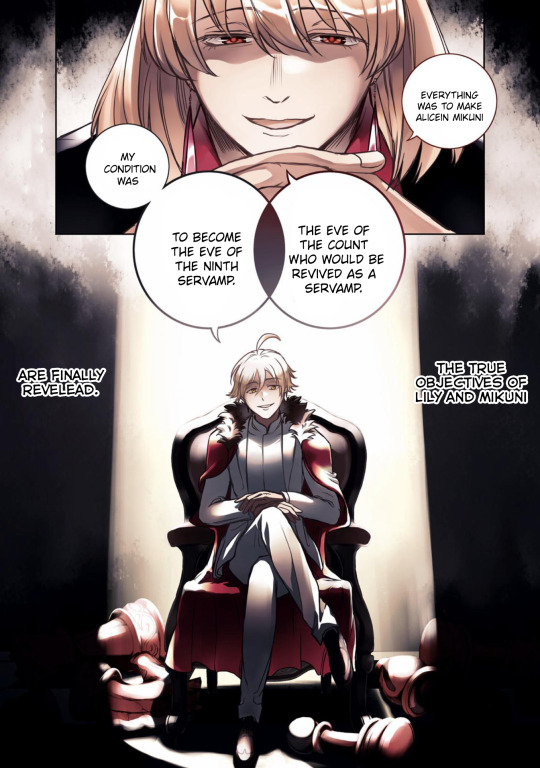
Read the chapter on Mangadex!
Keep reading for translation notes.
Oh boy, this chapter had some difficult lines that took me a while to translate and hopefully I managed to convey them ;;
Alright, to start off, I want to point out that in the top left panel, Hokaze is holding the novel Jane Eyre by Charlotte Brontë, so if you know the plot of the story, you can make connections with her. Also, regarding her name...It's sounds weird for her because she's a woman. I looked up Hokaze (歩風) on Japanese names sites and it was listed for boys, while the readings Ayuka or Honoka were listed for girls.
Well, if Tanaka-sensei hasn't mentioned so far that it wasn't a mistake, then her name is Hokaze.

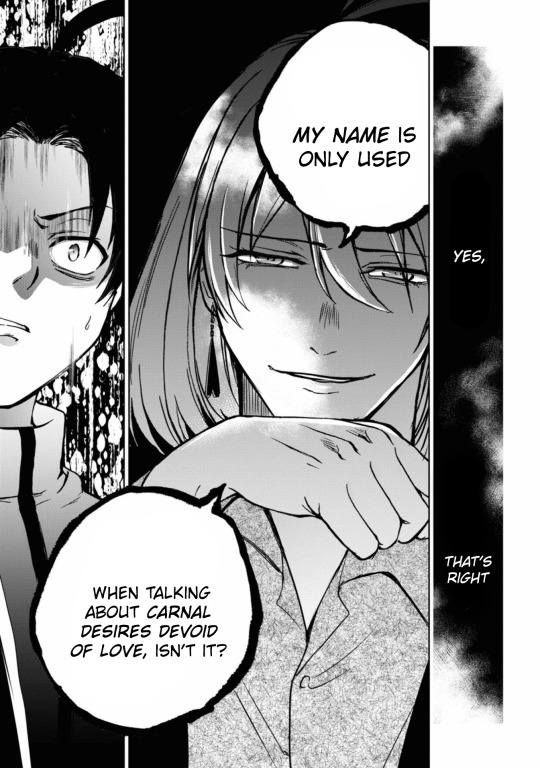
In Japanese, 情欲 and 色欲 mean lust the latter is the one used regarding Lily, however they have different nuances. Basically, the former implies a desire for emotional attachment as opposed to 色欲 that is focused on the physical aspects of attraction, without necessarily implying emotional attachment.
As you can see in the translation, the intended reading is 私 (I, myself) while the other reading is 色欲 (lust).
愛のない情欲のことだけを私 (色欲) の名前で呼ぶのでしょうから。
I had the most trouble with this page, like OMG...
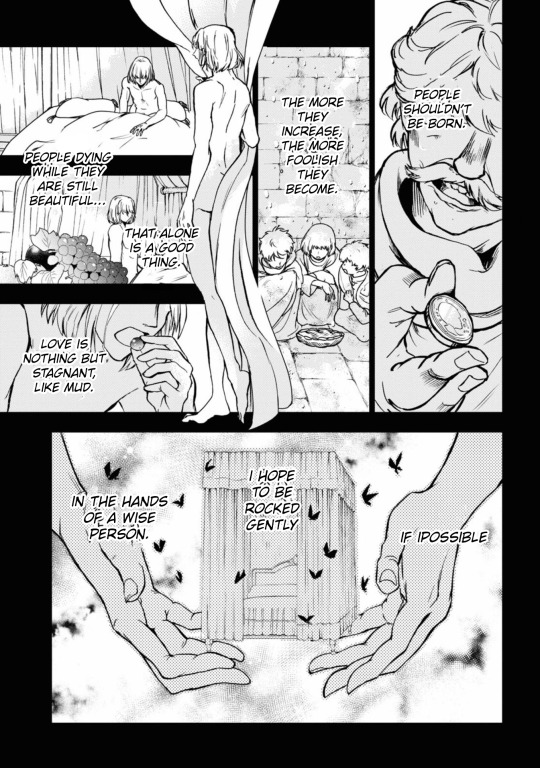
Lily had some difficult lines and it's possible that I haven't conveyed them to well, thus I will give insight on how I understood them. Here's the original line 人は美しい時間のままに死にゆく。 それだけがいい。
I don't like to assume things. I try my best to convey what characters say and of course I rely on the grammar that is used so that's why it was difficult to interpret the above line which I ultimately translated as "People dying while they are still beautiful...That alone is a good thing"
A direct translation would be "People will die in a beautiful time" which sounded weird...Like I said, maybe my interpretation isn't good and I wanted to add "should" because Lily's is giving his opinions and I thought it will work but I if it's not suggested by the grammar, I couldn't do that. If you look at the first line on this page where "should" is there because that's how a grammar part translates.
So yeah, it was tough working on this line seeing how it can be interpreted...
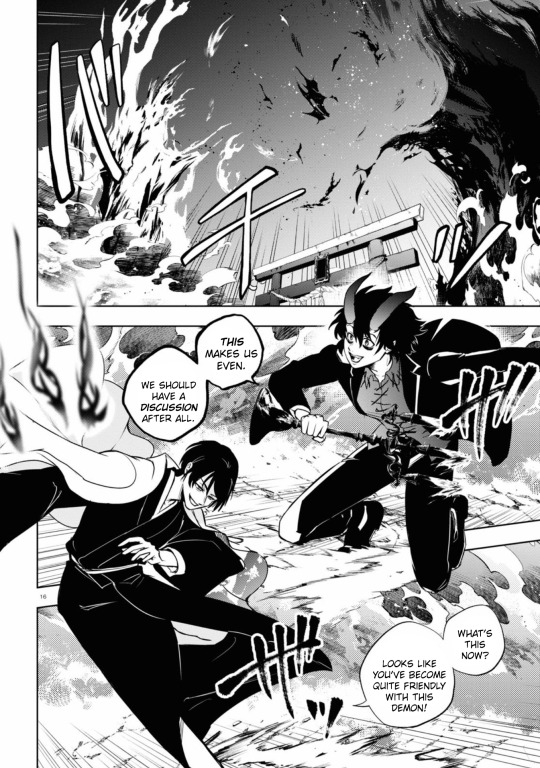
Sloth uses words that have alternative meanings. When he says "This makes us even", the other reading is fire. "We should have a discussion after all". The other reading is "fighting" and Sloth also said this in chapter 133.
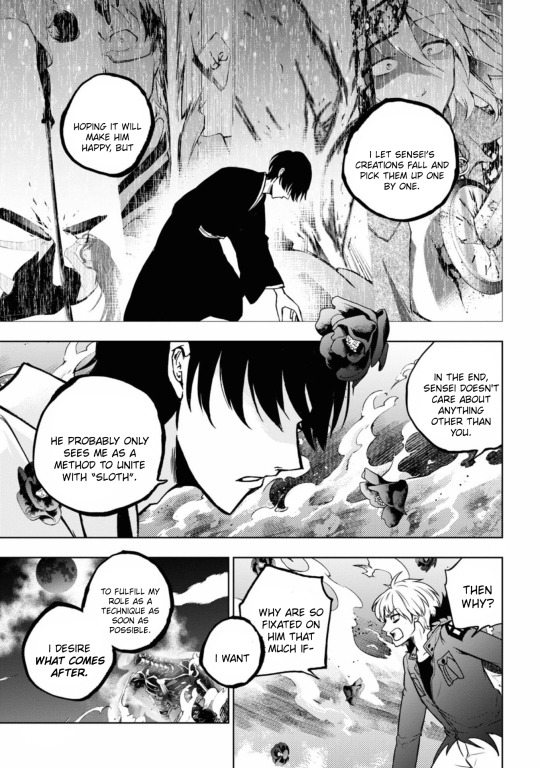
There is one word with another reading in Tsubaki's first line which I found that it has the meaning of "older sibling" although it's usually translated as head or neck 首 (kubi) My assumption is that Tsubaki used 首 with the connotation of "older sibling" because it reflects how he was born in the Edo period (revealed in later chapters), so he's using an archaic term. The intended reading is もの which means "object" and one theory I have about the other reading is related to the camellia flowers that are said to be associated with a head that is cut off because when they wither, the flowers fall at once.
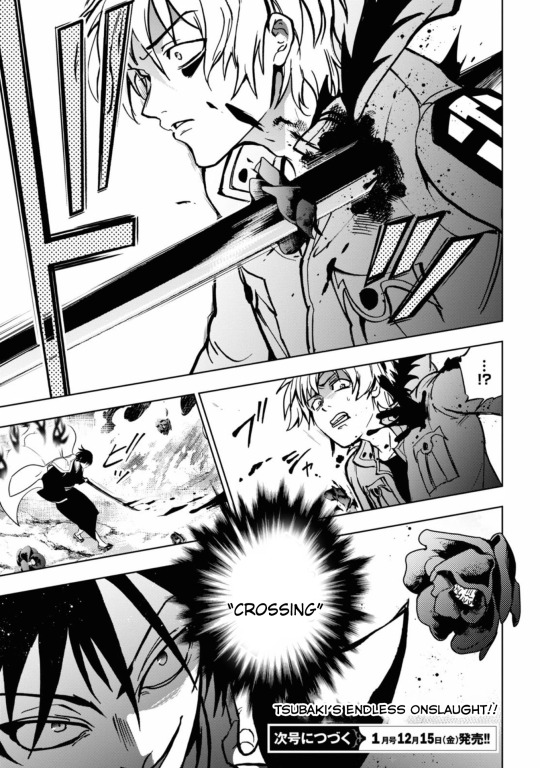
The last note is about Tsubaki's skill which is difficult to interpret its meaning ;;
I translated it as "Crossing".
The Japanese word 渡 comes from the verb 渡す that has the general meaning of "to hand over/deliver but there is also the meaning of "to transport", "to carry across". While it can be translated in several ways, I like the translation I made and I found that the verb is used "to say a requiem" 引導を渡す I'd say it connects with his ability "Shura Funeral". This term originally refers to a ritual or ceremony in Buddhism called "引導供養" (indou kuyou), where a deceased person's spirit is guided to the afterlife. So yeah, let me know what you think. I'd like to hear your opinions and I hope these notes are helpful!
182 notes
·
View notes
Text
On Yuuri's "top-secret" love life
Edit: Due to turning this post into a thread for the dead-bird site, I gave it a complete overhaul because some parts were wordy and confusing.
I took a deeper look into the information YOI gives us about Yuuri’s history with love and the implactions for his character arc.
Let’s start with when Viktor introduces the two Yuris to their new short programmes:

A first examination of the subject of love usually happens in puberty when the average person experiences their first crush. However, 23-year-old Yuuri just cluelessly shakes his head when Viktor asks whether he’s ever thought about love.
Since Yuuri has an evasive nature when feeling pushed or embarrassed, we can assume that he’s not hiding things here. Also interesting in this context, is his interpretation of Agape:

Yuuri is projecting his own experiences with love into his interpretation of On Love: Agape and Eros and his answers reflect where he’s currently at in his journey of exploring love. (for further discussion please check this meta).
Japanese language distinguishes general love 愛 (“ai”) from romantic/passionate love 恋 (“koi”). These terms roughly approximate the Greek concepts of agape and eros as they are utilised in YOI. However, YOI doesn't draw the distinction between 愛 and 恋 but uses 愛 (“ai”) as the overarching concept that includes other forms or love, e.g. せいてきな愛 (“sexual love”).
Until Viktor introduces the two Yuris into On Love: Agape and Eros, Yuuri has never wasted a thought on love. Which means:
Until the end of episode 2, Yuuri has never had romantic feelings for another person.
Why can we be so sure of that?
Even a first crush inevitably inspires an examination of love to some extent regardless of whether you’re happy in love, whether your feelings aren’t reciprocated or whether you decide not to act upon them.
If Yuuri had experienced such feelings before episode 2/3, he would know. And we would know, too, because it would impact his views on love, how he tackles his season’s theme, and how he goes about his relationship with Viktor. It would notably impact his character journey.
Instead, YOI introduces us to the extent of Yuuri’s parasocial obsession with Viktor that despite the gay-coding is too abstract to qualify as an actual crush. The Japanese term for “idol” that YOI uses for the people Yuuri idolises is the neutral 憧れの人 = “someone to look up to/admire”.
For the story of YOI to work as it does, Yuuri never having had romantic feelings is crucial.
Yuuri has one-track-mind that makes Viktor the fulcrum of his existence since he discovered Viktor at the onset of puberty (aka when young people start experiencing attraction for the first time). He has every poster of Viktor at least twice, he copied his programmes and he even named his poodle Katsuki Viktor (yes, that’s canon). In his endeavour to face Viktor as an equal on the ice, he move abroad to train with different coach. The show portrays Yuuri as being more interested in skating [to pursue Viktor] than in spending time with his friends, not that he'd be great at forming relationships in the first place because he's super awkward. Doesn’t sound like someone who even has the mind to notice potential partners around them, does it?
Now let’s move on to the press conference at the end of episode 5 that comprises Yuuri’s journey of exploring love and gives us some more insight into his views on love.

Since the subs are low-key confusing, I’m not quoting them, but you can check this translation to educate yourself on all the nuances that the official translation misses. Particularly interesting is this part:
My love. It’s not [general] love or romantic love that is easy to understand, but my bond with Victor, and the lukewarm way I feel about my family and my local community.
Note that this is the only time the anime uses 恋 ("koi"), probably because he's speaking to a Japanese audience.
Note that this is the only time the anime uses 恋 (“koi”), probably because he’s speaking to a Japanese audience.
This line give us clear idea on how Yuuri feels about the people in his life that are not Viktor, confirming what we’ve could already guess from context: that his relationships so far never reached a level that is intimate enough to enforce an examination of the subject of love. We tend to take our friends and family for granted, but crushes and falling in love are feelings that take over our lives.
Yuuri’s speech about love as a whole showcases that he has come a long way from utter cluelessness to the matured and nuanced idea of love that he now explaines to his audience. He was able to arrive at this point because his time with Viktor sparked the examination of the subject. Yuuri draws a clear distinction between his feelings for his family and friends and his feelings for Viktor, which aren’t lukewarm at all.

A more accurate translation of that line is: “The first person I want to tie myself to and never let go is Viktor” ( 初めて自分から繋ぎとめたいと思った人、それがヴィクトルです) because 繋ぎとめたい means wanting to tie someone / something to you and never let it go (see this translation error masterpost).
After months of getting to know Viktor intimately, Yuuri has fallen in love with Viktor at last. This feeling is bigger than any emotion he has experienced before because it’s greater than 恋 and 愛 and because of that:
This feeling doesn't have a name, but I decided to dare to call it "love".
Yuuri is awkward and anxious, but he’s determined to pursue a goal he committed himself to. For half his life that goal was Viktor, first as an abstract concept and as an ideal to strive for, later as a romantic interest, and he makes sure the world knows.
If Yuuri had had romantic feelings for someone else, he would have pursued this person or ruled out the idea because Viktor was more important and it would have impacted his views on love either way.
Or in other words:
Viktor is Yuuri's first love.
I will discuss the gay-coding of how Yuuri idolises people that inspire him in another post because this seems to be one of the lesser known facts.
For this analysis I've reviewed the entire context of Yuuri's history with love and ruled out everything that doesn't withstand scrutiny or makes no sense in the grand scheme of things (aka the canon of YOI as a whole). You are free to headcanon Yuuri as having had crushes or relationships before Viktor, but keep in mind that this would alter the plot of YOI.
Friendly reminder: friendship, admiration, and aesthetic attraction are often misconstrued as romantic attraction due to allonormative/amatonormative paradigms. When interpreting fictional characters, the entire context must be reviewed to check whether there is more to that.
#yuri on ice#yoi meta#yuri on ice meta#my yoi meta#katsuki yuuri#viktor nikiforov#yoi#yuri!!! on ice#viktuuri#another post that took me some weeks to write
175 notes
·
View notes
Note
I've noticed that you are interested in stories with multiple blind characters and often propose adding more blind characters to a story as a solution. I really struggle with this because it's not as simple as that -- stories don't have infinite narrative space. The idea that every story has a large cast is influenced by the prevalence of long serialized media in fandom: webcomics, TV shows, etc. But many writers (myself included) write a lot of novellas and short stories which often only have a few characters -- maybe even only 1 or 2! Even novels don't usually have huge expansive casts -- maybe 5 main characters with some additional side characters.
Considering this, I don't understand how it's realistic for every story (or even, say, 50% of stories) to have multiple blind characters (without it feeling forced). This is compounded by the fact that most blogs that talk about other forms of representation say the same! So if I write a 2-character short story and the protagonist is a blind Latino man, does the second character also have to be a blind Latino man? It just doesn't make sense! This is just a general problem I've noticed in discussions around representation -- there's an assumption that every cast will have 10+ characters and narrative space to develop those characters, even though that's not realistic for most narrative forms.
Do you have any thoughts on this?
Writing Multiple Blind Characters in Short Stories
Hi Anon! Surprise. I write short stories as well. I have experience with this. I have never felt like my blind characters were forced or unrealistic, even with having several of them in the same story. I’ll try to explain what might help you.
First, the idea that multiple blind characters is forced or unrealistic comes from ableism. Think about why you feel there is a limit on disabled characters. If you can create stories, I would hope you are creative enough to consider the possibility that multiple blind characters could exist in the same place and time. Challenging this barrier opens up more possibilities, allowing you to explore different types of blindness, different reactions to it, different upbringings, and multiple ways of living, adapting, and navigating being blind.
Second, blind characters need access to their own community. This is where they learn how to be blind. This where they get support. This is where they might find understanding and belonging. You can find more information about community here in an excellent reblog. Also, here.
As you mentioned, I often suggest adding more blind characters when writers insist upon using stereotyped portrayals. Having multiple characters with different experiences helps to make your story more realistic and nuanced, contrary to what people might implicitly believe. Having more than one blind character is something I highly recommend because it helps with not having all your representation rest on the shoulders of one character.
For example, if you are worried a main character who has cloudy eyes might reinforce the idea that all blind people have cloudy eyes, having another blind character with a different experience may help. If one of your blind characters is naive and innocent, you might have another blind character who is brash, displays a lack of trust in others, and has a lot of shocking stories. Maybe they’re in a rock band together. They met while playing blind football (aka soccer) on a middle school team. They bonded over their pet cats and sour patch kids.
Or something.
Another important thing to remember when writing is that you have control over the story. Too many writers come to me feeling stuck because they feel they cannot change their story while also wanting to incorporate my suggestions. This makes it challenging to address implicit bias or stereotypes, much less guide writers in going in different directions.
Additionally, I feel uncomfortable with the complaints about other blogs in this ask. I feel like this isn’t really about me, nor is it something I can comment on. I will say that it sounds as if a bunch of blogs dedicated to helping people write marginalized characters are mentioning some of the same things. They are probably doing so for a reason.
However, while it helps, writing multiple blind characters won’t improve every story, which I explained in my review of the book Blind. I was not impressed with this book. I did not feel that the four blind characters were very good, nor did having them help with offsetting the portrayal of blindness as a miserable experience.
Conversely, one of my favorite blind characters is Toph Beifong from Avatar: The Last Airbender. Despite being the only blind character in the show, the writers did a good job with her. Would I have liked her to meet more of her community as she travels with the Gang? Absolutely. Even though I like her, she still never had access to her community after being isolated by her parents for so long.
So, no, you don’t need to have multiple blind characters if the suggestion bothers you this much. I even provided good examples of what to do, what not to do, and times where my typical advice was not as helpful for the resulting story.
However, please consider where these feelings stem from. Consider the origins of the idea that having multiple blind characters is unrealistic. Using the example you provided in your question, I wonder, would you say the same if both your characters were white and abled? Is there any way you can challenge the fear of seeming unrealistic? What about being considered unrealistic bothers you so much?
You don’t necessarily need to have characters in the story for them to exist. Even background characters can help. I will try to give some ideas for this:
Does your blind character have family they can talk about or remember? Are any of their family members blind?
Do they have any friends? Just because the friends aren’t in the story doesn’t mean they don’t exist at all.
Does the blind character have any formative memories or flashbacks?
Does the character who isn’t blind know any blind folks?
Your characters should have lives outside of the story. They should have memories and experiences that made them who they are. This is where you can have other blind characters. Perhaps this is how your blind character can have a community.
However, I would still like to see more blind characters interacting with each other. This is what I want as a blind person. If you don’t want to go that direction, that’s fine.
I hope this helps.
#blind#blind characters#writing blind characters#ask#scheduled post#writing more than one blind character#multiple blind characters#ableism#let blind people have friends and community challenge
211 notes
·
View notes
Text
Let's discuss the translations for this page from chapter 698 as well as the missing nuances
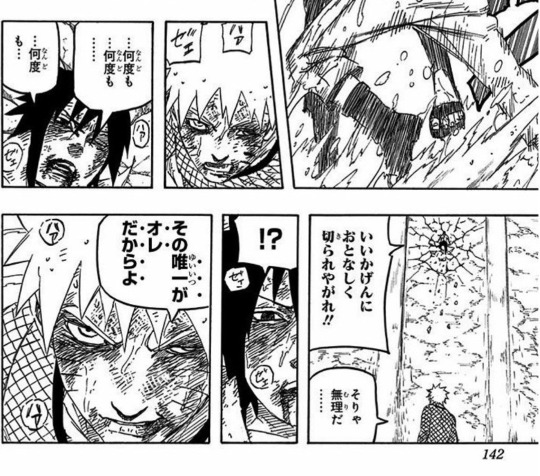
First we have the infamous line from Sasuke
「何度も・・・何度も・・・何度も・・・」
Nando mo… nando mo… nando mo...
Over and Over.... and Over and Over.....
Sasuke is essentially getting frustrated that after trying so many times he still isn't able to do it. Naruto is giving him so much work.
Let's look at how the official translation decides to paraphrase to it

..No matter how many times I try to knock you down...... Every single time you just keep on...
Not inaccurate but it still doesn't quite convey the frustration from the original Japanese line.
The next part is
「 いい加減におとなしく切られやがれ !! 」
「おとなしく」 has following meanings

If I had to do a literal translation of the sentence then it would be
Just be obedient and let it get cut already !!
The Viz version again does something different
Just give me a fucking break and fall already !!
Interestingly they also remove the part where Sasuke says he wants Naruto to obey/submit to him lol
I am not surprised they do that because keeping that in the sentence makes it sound..well
From the MangaPanda translation:
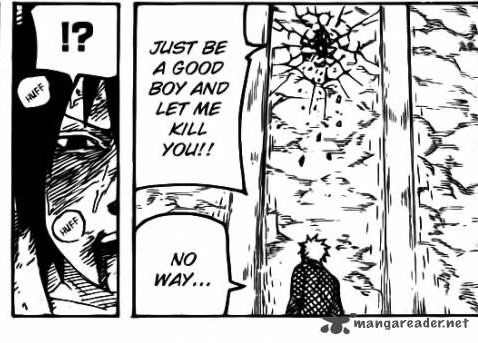
(btw you are not gonna believe what certain suggestions I got in relation to the search results for that word )
Anyways this was pretty trivial but yet another example of Viz's needless sanitisation of dialogues.
However neither of the English translations retain the original meaning for this part of the sentence
..and let it get cut already !!
"Fall already" or " let me kill you" are just not the same.
The original dialogue is purposefully vague, 'it ' refers to both the physical life of and the bond to Naruto
Next is Naruto's response
「そりゃ無理だゆい い.....」
That's impossible....
「その唯一がオレだからよ」
Because I am the (your?) one and only
'your' isn't written there but it is pretty much implied from their previous conversation.
Viz's translation:
I can't...
Because that is who I am
The entire flow of the conversation implies that Naruto can't die simply because he is HIM, which he was also saying, but these lines completely remove the implications that Naruto was also insinuating that he wasn't gonna let their bond get cut off because he is Sasuke's only one.
Also while we are at it can we also talk about the anime adaptation of the scene just before this conversation.
There are a lot of wrongs in the VOTE 2 fight and everything aside WHERE IS THE PROLONGED EYE CONTACT WITH NARUTO'S EYES ???

73 notes
·
View notes
Note
Idk maybe it sounds weird but I wanted to say thank you for openly saying you didn't like some parts of the game. I've seen so many comments like "oh just admit that you actually hate dragon age" when someone is trying to question certain decisions the devs made. I love dragon age, i love each of the 3 games and I love how complex, nuanced and colorful this story has been. I don't hate the new game, I actually love some parts of it - it's just different. It feels different, the writing is different and sometimes questionable, a lot of the things I expected to see were not there, the lore feels a bit altered. It's good that we can all discuss these things I guess
I think most of the people saying those things have me blocked because I haven’t seen any of that (which you know is fair you should curate your own space and all that)
There isn’t a series that means more to me the Dragon Age, it has had a very special place in my heart for 15 years, which is why I held Veilguard in such a high regard before release. It sounds silly to say but these games have gotten me through quite a few hard things in my life and Veilguard is going to get me through another
Veilguard is a fine game for what it is. I love the companions and the combat is fun and it’s beautiful. I yelled in excitement and I cried with grief and sadness several times… but it could’ve been so much more. There were so many things tossed to the side that could’ve been made into something wonderful. There’s nothing wrong with acknowledging that
It’s not healthy to place something on so high of a pedestal you cannot see its flaws anymore, regardless of how important it is to you
I know I have a few devs following me and it’s not my intention to insult or belittle anyone’s work. You did a great job with what you were given and I’m grateful for that. Veilguard is a different game with a different kind of heart to it, but that isn’t entirely a bad thing. Regardless, we can still be sad about what it could’ve been and what it isn’t
#this is my blog where I put my thoughts and feelings#and interact with other people who want to interact with me in asks like this one#It’s okay not to like every aspect of something and still enjoy it#what I put here is for me if it isn’t something people want to look at then get rid of me no hard feelings#dragon age#dragon age veilguard#dragon age the veilguard#asks for bee#people following me have seen my reactions to the good things as well as the bad#I won’t not acknowledge something about how I feel out of fear it’ll make a stranger angry
100 notes
·
View notes
Text
Fallen Sapphire Tears (Yandere!Sunday x Reader x Yandere!Aventurine)
My last little post got me thinking…who else would share?
Then I decided I can force people to share for the fun of it! I figured it’d be interesting to see the striking balance between Sunday and Aventurine—both so vastly different characters, and figured out they’d fit one soul quite nicely—so, enjoy!
Spoilers for the new 2.2 quest up ahead and general yandere content trigger warnings! Oh and pregnancy allusions.
Aventurine and Sunday would both enjoy a justice-oriented darling—not just any justice either, but lawful and distinct justice, the kind casts away nuance in favor of the black and white stance and hope.
Aventurine obviously notices you first in this sweet dream and wishes to indulge you in a wager—it only gets him more antsy when you decline on principle, a wager so large means either he’s an addict, or can surely win, right? So what point would there be in playing…
He stands still in that answer—certainly not the first time he’s heard a no or been called an addict but it’s the first he’s been called an addict while saying no. In your eyes, too, it seems like you vaguely care about the former. He laughs it off then.
But continues to think heavily.
When you come back—it only intrigues him more.
Too bad he has to take a quick curtain call.
Sunday met you after, much later once you and Aventurine become close acquaintances almost friends. He notices your looks first—beauty to him, not in how orderly you look per se but…in how your clothes all fit a distinct role and place, how the style of your hair even if not particularly styled balances out this order of roles. Even disheveled homeless men have a certain look to them determined by the roles of their clothes—and you encompass that to him.
It kept his eye on you enough so that when you chose your answers…when you spoke of justice behind your choice in every section. To save a bird is just, to let the law catch a man willing to send his own children whom we don’t even know exist, and to support his dear sister despite him not..it all was quite eye opening to him on the justice his order needed.
He wouldn’t kidnap you immediately only because he would take great care in making your cage—only to then find Aventurine having found you and offering you to leave this place.
They should have killed eachother right then and there—but somehow, a word became a conversation and they came to an agreement.
Of course, they would keep you in the cage together—Aventurine could find and exploit every weakness in the cage crafted to before you had the chance to, and hide information about you from anyone else who would ask. Sunday keeps the cage crafted and gives instruction as needed. Even if it means a bitter false defeat to keep a hidden you.
Aventurine spends most days with you—when he isn’t working you two play games, even if you don’t want to he still tries to play with you, and he often orders take out—can even do a little cooking if you ask. He’s almost moldable—doing as you ask as long as it isn’t escaping related or not keeping an eye on you.
Sunday spends nights with you—sometimes there’s idle chatter with a dinner or late night snack and conversation of the world—but oftentimes it’s silent cuddling as he holds you. Perhaps even Aventurine too if that’s what it took to hold you.
Everything quickly becomes boring and mundane with them—and they know how to keep it that way.
You have a list of small chores while housekeeping does the rest, which is a light dust in some areas and tidying up basic things. It’s so domestic that it almost feels like you’re a rich housewife without a care to actually clean…
Funnily enough, being the last of a kind is gettting to Aventurine and of course Sunday is rather…family-oriented.
Perhaps it is time for another discussion.
AN: Ik it’s short and scattered but I’m thinking of writing like an actual fic for this one so it’s going to stay like this for now.
108 notes
·
View notes